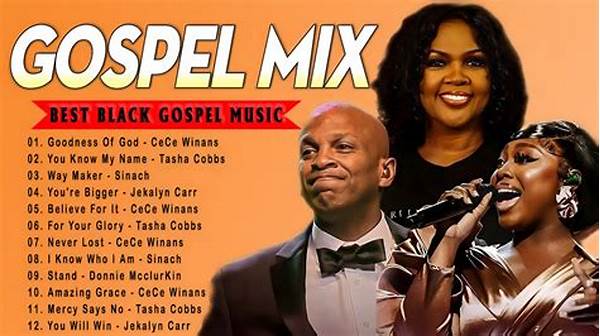Hey there, music lovers! Have you ever noticed how some gospel songs just seem to hit all the right notes, not just in our hearts but on the music charts too? It’s fascinating to see gospel hits on the charts, making waves alongside pop, rock, and hip-hop. Let’s dive into what makes these tunes resonate so widely and climb those coveted chart positions.
The Rise of Gospel in Mainstream Charts
Gospel music has a way of uplifting spirits, and recently, it’s been reaching beyond the church halls into mainstream music charts. Artists like Kirk Franklin, Tasha Cobbs Leonard, and Jonathan McReynolds bring powerful messages and soul-stirring vocals that captivate audiences. Their gospel hits on the charts are not just coincidences; they highlight a universal craving for hope, inspiration, and meaningful lyrics. As these songs climb the charts, they prove that the heart of gospel music—its ability to connect deeply and spiritually—remains relevant in our modern world. When you’re singing along, it’s more than just a melody; it’s an experience that transcends boundaries and speaks to the soul. Each track is a reminder that no matter the genre, powerful music finds its way into the charts and our hearts.
Why Gospel Hits Are Charting
1. Universal Message: People crave hope and positivity. Gospel hits on the charts offer messages that resonate with many, irrespective of religious views.
2. Talented Artists: Top-notch vocalists and musicians make these songs a treat, attracting diverse audiences.
3. Memorable Tunes: Catchy melodies and rhythms contribute to their widespread popularity.
4. Collaborations: Gospel artists collaborating with mainstream musicians helps broaden their reach.
5. Streaming Power: Platforms like Spotify and Apple Music have made it easier for gospel hits on the charts to reach ears globally.
Gospel’s Unique Position on the Charts
There’s something profoundly unique about gospel hits on the charts. For one, these songs often carry messages of hope and faith, offering a respite from the daily grind. In a world where songs about fleeting romances and breakups often dominate, gospel music stands out by touching on timeless themes. Artists like Lecrae have skillfully blended gospel with genres like hip-hop, appealing to a broader audience. These crossover styles have certainly influenced the chart positioning, showing that gospel isn’t confined to one sound or audience. Gospel hits on the charts often act as a beacon of light, offering solace and a sense of unity, which is perhaps why they have such staying power on the charts.
Exploring More Gospel Chart-Toppers
1. Diversity in Sound: Today’s gospel tracks encompass a range of styles, from contemporary to traditional.
2. Cultural Impact: They not only chart but also shape social conversations, highlighting issues like justice and community support.
3. Consistent Quality: High production values ensure these songs are competing at every level.
4. Influence of Live Performances: Dynamic live shows boost popularity and drive sales.
5. Fan Engagement: Loyal fans often promote these songs on social platforms, propelling gospel hits on the charts.
6. Power of Storytelling: The narratives within gospel music captivate listeners, creating a deeper connection.
7. Role of Award Shows: Recognition at awards boosts the visibility and popularity of gospel songs.
8. Gospel’s Crossover Appeal: Collaborations with non-gospel artists broaden exposure.
9. Emotional Connection: Gospel music’s emotional depth keeps listeners coming back.
10. Radio Play: Regular airplay on various radio stations introduces gospel to varied audiences.
The Future of Gospel Music on the Charts
So, what does the future hold for gospel hits on the charts? Well, it’s looking bright! As more artists experiment with combining gospel and other musical styles, their reach widens. The growth of digital platforms means that these inspiring tunes can reach anyone, anywhere. Additionally, as listeners continue to seek music that speaks to deeper emotions and life’s big questions, gospel offers something timeless and necessary. Its position on the charts is more than just about numbers; it’s a testament to its enduring impact. Whether it’s through powerful live performances or viral online moments, gospel hits will continue to rise, connecting with audiences seeking authenticity and hope amidst the noise of ordinary life.
The Worship Factor
What’s the secret ingredient that makes gospel hits on the charts so captivating? Many would argue it’s the “worship factor.” These songs aren’t just played; they’re experienced. During moments of personal reflection or in communal settings, the emotive element within gospel music makes it resonant. It’s a unique draw and one that isn’t replicated in other genres. Gospel’s contribution to musical conversations is undeniable, pulling people in with both its sound and its message. As artists continue to innovate, we can expect gospel music to keep its foundational elements while exploring new avenues. This evolution not only strengthens its place on the charts but also cements its critical role in enriching our musical landscape.
Conclusion: Gospel’s Everlasting Chart Journey
To wrap it up, the journey of gospel hits on the charts is nothing short of remarkable. Their presence is a reminder of music’s power to transcend barriers, offering solace, hope, and a sense of community. Whether through uplifting lyrics, unforgettable melodies, or transformative live performances, gospel music continues to capture hearts and top the charts. Its future is undoubtedly bright, with new artists emerging and long-time favorites still pushing the genre’s boundaries. As we look to the future, it’s evident that gospel is here to stay, reminding us all of the universality of its message and the timeless appeal of its sound. So, next time you’re checking out the charts, keep an ear out for those gospel hits—you might just find your next favorite song!
